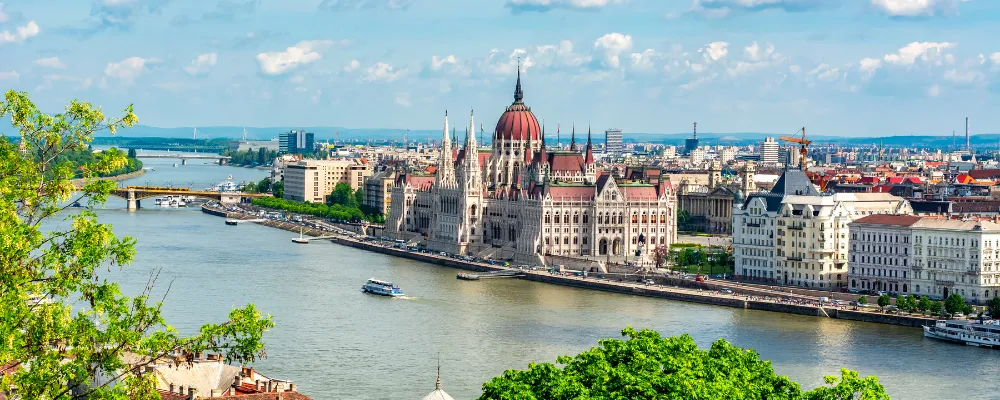Why is Hungary said to be the best destination for overseas study for Nepalese students?

Hungary has emerged as an increasingly popular destination for international students, including those hailing from Nepal, owing to several compelling factors:
Academic Excellence: Hungarian universities are esteemed for their commitment to academic excellence and offer a diverse array of programs across various disciplines. This ensures that students, including those from Nepal, have access to top-tier education that is globally recognized.
Cost-Effective Education: Hungary presents a cost-effective option for students pursuing higher education abroad. Tuition fees in Hungarian universities are generally more affordable compared to those in other European countries, making it an attractive choice for Nepalese students mindful of budget constraints.
Scholarship Opportunities: Hungary extends numerous scholarship opportunities to international students, further easing the financial burden of studying abroad. These scholarships, which cover tuition fees and may include living expenses, enhance accessibility to education for Nepalese students.
English-Language Programs: Many universities in Hungary offer programs taught in English, eliminating language barriers for international students, including those from Nepal. This facilitates a seamless learning experience and enables students to fully engage with their chosen field of study.
Cultural Enrichment: Hungary’s rich cultural heritage and diverse society provide a stimulating environment for international students. Nepalese students have the opportunity to immerse themselves in Hungarian culture while also interacting with peers from around the world, fostering cross-cultural exchange and understanding.
Central European Location: Situated in the heart of Europe, Hungary serves as an ideal base for students keen on exploring the continent. Its central location facilitates convenient travel to neighboring countries, allowing Nepalese students to broaden their horizons and partake in diverse cultural experiences.
Safe and Supportive Environment: Hungary is renowned for its safety and welcoming atmosphere, making it particularly appealing for international students. Nepalese students can feel assured of a conducive environment for learning and personal growth, supported by the country’s student-friendly policies and infrastructure.
In essence, Hungary offers Nepalese students a compelling blend of academic quality, affordability, scholarship opportunities, English-language instruction, cultural immersion, geographic accessibility, and safety, making it an attractive destination for pursuing higher education abroad.
What courses are generally selected by Nepalese students for abroad education in Hungary?

Nepalese students pursuing education abroad in Hungary are drawn to a wide array of courses spanning diverse fields. Here are some of the popular choices among Nepalese students:
Medicine and Health Sciences: Renowned medical universities in Hungary offer programs in medicine, dentistry, pharmacy, and nursing. Nepalese students are attracted to these programs for their high-quality education and practical training opportunities.
Engineering and Technology: Disciplines such as civil engineering, mechanical engineering, electrical engineering, computer science, and information technology are favored by Nepalese students. Hungary’s universities provide innovative programs emphasizing practical skills and research.
Business and Economics: Programs in business administration, economics, finance, and management are appealing to Nepalese students interested in business careers. Hungary’s business schools offer comprehensive education and networking opportunities.
Natural Sciences: Fields like biology, chemistry, physics, environmental science, and mathematics are also popular choices. Nepalese students benefit from hands-on experimentation and research in modern laboratories.
Social Sciences and Humanities: Disciplines including psychology, sociology, international relations, and political science attract Nepalese students seeking to understand human behavior and society. Hungary’s universities offer interdisciplinary programs focusing on critical thinking and analytical skills.
Arts and Design: Programs in fine arts, graphic design, fashion design, and architecture cater to Nepalese students with a creative flair. Hungary’s vibrant arts scene and historical architecture provide an inspiring backdrop for artistic exploration.
Language and Literature: Nepalese students interested in learning the Hungarian language and delving into Hungarian culture and literature opt for language and literature programs. These courses often include language instruction alongside cultural studies.
Agriculture and Environmental Studies: With Hungary’s rich agricultural heritage and commitment to environmental sustainability, programs in agriculture, forestry, environmental science, and sustainable development appeal to Nepalese students interested in these fields.
These choices reflect the diverse interests, career aspirations, and academic backgrounds of Nepalese students. Ultimately, the selection of a course depends on individual preferences and goals, guiding Nepalese students to explore various study options in Hungary.
Famous cities in Hungary for abroad education for Nepalese students:

Hungary boasts several cities that are highly popular among international students, including those from Nepal, seeking to study abroad. Here are some renowned cities in Hungary known for their educational institutions and vibrant student life:
Budapest: Serving as the capital and largest city of Hungary, Budapest stands as a major center for education and culture. It hosts prestigious universities like Eötvös Loránd University (ELTE), Central European University (CEU), Budapest University of Technology and Economics (BME), and Semmelweis University. With its historic landmarks, lively nightlife, and diverse international student community, Budapest offers a rich cultural experience.
Debrecen: As Hungary’s second-largest city, Debrecen has garnered a reputation for academic excellence, especially in fields like medicine, science, and humanities. The University of Debrecen, a leading institution in the country, attracts a considerable number of international students, including those from Nepal. Debrecen provides a more laid-back atmosphere compared to Budapest, focusing on academic rigor and student support.
Szeged: Nestled in southern Hungary, Szeged is a picturesque city renowned for its academic institutions and research centers. The University of Szeged shines in natural sciences, medicine, humanities, and social sciences. Offering a serene setting along the Tisza River and a hospitable community, Szeged presents an ideal blend of academic pursuit and quality of life for international students.
Pécs: Positioned in the southwest, Pécs boasts a rich historical background, cultural diversity, and academic prominence. The University of Pécs, one of Hungary’s oldest institutions, offers a diverse array of programs spanning health sciences, humanities, natural sciences, and engineering. Pécs offers a tranquil yet vibrant environment, providing ample opportunities for cultural immersion and outdoor adventures.
These cities, along with others in Hungary, present outstanding educational prospects, supportive atmospheres for international students, and distinct cultural encounters. Nepalese students considering studying abroad in Hungary should evaluate factors such as program availability, location, living costs, and student services to select the city best suited to their educational and personal preferences.
What are the eligible criteria to study in Hungary for Nepalese students?

The eligibility criteria for studying in Hungary can indeed vary depending on factors like the university, level of study, and program. However, there are some general requirements that Nepalese students or any international students aspiring to study in Hungary typically need to meet:
Academic Qualifications: Applicants are usually expected to have completed their previous level of education with satisfactory grades. This could mean having a high school diploma for undergraduate programs or a bachelor’s degree for master’s programs. However, specific academic requirements may differ between universities and programs.
Language Proficiency: While some programs are taught in Hungarian, many universities offer programs in English. For English-taught programs, applicants typically need to demonstrate proficiency in English through standardized tests like the TOEFL or IELTS. Some universities may also conduct their own language proficiency assessments.
Entrance Exams or Interviews: Certain universities or programs may require applicants to take entrance exams or participate in interviews as part of the admissions process. These assessments aim to evaluate the applicant’s academic knowledge, skills, and suitability for the program.
Valid Passport: Applicants must have a valid passport that remains valid for the duration of their intended stay in Hungary.
Health Insurance: International students are usually required to have health insurance coverage for the duration of their studies in Hungary. This can be arranged through the university or obtained independently.
Financial Resources: Applicants may need to demonstrate sufficient financial resources to cover tuition fees, living expenses, and other related costs during their stay in Hungary. This could involve providing bank statements, scholarship awards, or financial sponsorship letters.
Visa Requirements: Like other international students, Nepalese students typically need to obtain a student visa or residence permit to study in Hungary. This process often involves submitting various documents, including the university’s acceptance letter, proof of accommodation, proof of financial resources, and health insurance.
It’s crucial for prospective students to carefully review the specific requirements of the universities and programs they are interested in. Additionally, seeking guidance from the university’s admissions office or contacting the Hungarian embassy or consulate in Nepal can provide further clarification and assistance throughout the application process.
Scholarship opportunity for Nepalese students in Hungary for Abroad education:

Hungary offers several scholarship opportunities for international students, including those from Nepal, who wish to pursue education in the country. These scholarship programs provide financial support to cover tuition fees, living expenses, and other costs associated with studying abroad. Here are some notable scholarship programs available for Nepalese students in Hungary:
- Stipendium Hungaricum Scholarship Program: This fully-funded scholarship program is offered by the Hungarian government to support international students from partner countries, including Nepal. It covers tuition fees, accommodation, health insurance, and a monthly stipend. Nepalese students can apply for this scholarship through the Tempus Public Foundation or the Hungarian Embassy/Consulate in Nepal.
- Erasmus+ Scholarship: The Erasmus+ program, funded by the European Union, offers scholarships for international students to study abroad in European countries, including Hungary. Nepalese students can explore opportunities to participate in Erasmus+ exchange programs or joint master’s degree programs with partner universities in Hungary.
- Bilateral Agreements: Hungary has bilateral agreements with various countries, including Nepal, which may include scholarship provisions for students. Nepalese students should check if there are any specific bilateral scholarship programs available between Hungary and Nepal through government agencies or educational institutions.
- University Scholarships: Many universities in Hungary offer their own scholarship programs for international students, based on academic merit, financial need, or specific criteria. Nepalese students should inquire directly with their chosen universities in Hungary about scholarship opportunities available to them.
- Research Grants and Fellowships: Nepalese students interested in pursuing research or doctoral studies in Hungary may be eligible for research grants or fellowships offered by Hungarian universities, research institutions, or international organizations.
It’s essential for Nepalese students to carefully review the eligibility criteria, application deadlines, and application procedures for each scholarship program they are interested in. They should also ensure that they meet the academic and language requirements of their chosen university and program in Hungary. Additionally, seeking guidance from the Hungarian Embassy/Consulate in Nepal or educational agencies can provide valuable assistance in navigating the scholarship application process.
What are the job opportunities for Nepalese students in Hungary?

Nepalese students studying in Hungary may have various job opportunities available to them during and after their studies. Some of the potential job opportunities for Nepalese students in Hungary include:
- Part-time Jobs: Many students in Hungary, including Nepalese students, take up part-time jobs to support themselves financially while studying. Common part-time job options include working in cafes, restaurants, retail stores, tutoring, administrative work, or as language tutors.
- Internships: Hungarian universities and companies often offer internship opportunities for students, allowing them to gain practical work experience in their field of study. Nepalese students can explore internships related to their academic discipline, which can enhance their skills and improve their employability.
- Research Assistantships: Students pursuing research-oriented programs may have the opportunity to work as research assistants in university laboratories or research institutes. This provides valuable research experience and may lead to further academic or career opportunities.
- Graduate Opportunities: Upon completing their studies, Nepalese students may explore job opportunities in Hungary, especially in sectors where there is demand for their skills and expertise. Graduates in fields such as engineering, IT, healthcare, business, and finance may find job opportunities in Hungarian companies or multinational corporations operating in Hungary.
- Entrepreneurship: Some Nepalese students may choose to start their own businesses or entrepreneurial ventures in Hungary. The Hungarian government offers support programs and incentives for startups and entrepreneurs, making it an attractive option for aspiring business owners.
- Language Teaching: Nepalese students proficient in English or other languages may find opportunities to work as language tutors or instructors, either through language schools, private tutoring, or online platforms.
- Freelancing and Remote Work: With the rise of remote work opportunities, Nepalese students can explore freelancing opportunities in various fields such as graphic design, web development, content writing, digital marketing, and translation services.
It’s important for Nepalese students to familiarize themselves with Hungarian labor laws and visa regulations regarding employment opportunities for international students. Additionally, networking, building professional connections, and actively seeking out opportunities can significantly enhance job prospects in Hungary.
What is the best time for Nepalese students to apply in the New Hungary for higher education?

The best time for Nepalese students to apply for higher education in Hungary typically depends on several factors, including the academic calendar of Hungarian universities, the specific deadlines for admission and scholarship applications, and the desired intake period for the chosen program. However, here are some general guidelines to consider:
Early Preparation: It’s advisable for Nepalese students to start researching universities and programs in Hungary well in advance, preferably at least 12-18 months before the intended start date of their studies. This allows ample time to explore various options, gather necessary documents, and prepare for the application process.
Admission Deadlines: Hungarian universities typically have specific admission deadlines for each academic year or semester. Nepalese students should check the admission requirements and deadlines for their chosen programs on the university’s official website or contact the admissions office for detailed information.
Scholarship Deadlines: If Nepalese students are planning to apply for scholarships, such as the Stipendium Hungaricum Scholarship Program or university-specific scholarships, they should carefully note the scholarship application deadlines. These deadlines may vary from one scholarship program to another and are often earlier than the regular admission deadlines.
Intake Periods: Hungarian universities usually offer two main intake periods for international students: the fall intake (starting in September/October) and the spring intake (starting in February/March). Nepalese students should plan their application timeline accordingly, considering the start date of their desired program and the associated visa processing time.
Visa Processing Time: After receiving an admission offer from a Hungarian university, Nepalese students need to apply for a student visa or residence permit to study in Hungary. Visa processing times may vary, so it’s essential to factor in sufficient time for visa application and processing before the start of the academic semester.
Language Preparation: If the chosen program is taught in Hungarian, Nepalese students may need to demonstrate proficiency in the Hungarian language through standardized language exams (such as the TELC or the Hungarian Language Proficiency Exam). Adequate time should be allocated for language preparation and exam scheduling.
Overall, the best time for Nepalese students to apply for higher education in Hungary is typically several months before the intended start date of their studies, taking into account admission deadlines, scholarship opportunities, visa processing time, and language preparation requirements. Starting the application process early and staying organized can increase the chances of securing admission and scholarships to pursue studies in Hungary.










